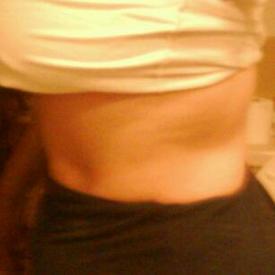Any studies to back up the"fool your metabolism" theory?

NYCNika
Posts: 611 Member
I see some people doing things like eating 500 cal one day and 1800 on the other to "fool their metabolism".
Are there actual scientific studies to that effect or is it of the "sounds logical to me" kind of thing?
Because this seems to be a lot of stress on the body, and eating 500 calories just seems like not a good thing.
Are there actual scientific studies to that effect or is it of the "sounds logical to me" kind of thing?
Because this seems to be a lot of stress on the body, and eating 500 calories just seems like not a good thing.
0
Replies
-
You can't fool your metabolism. Thousands of years of evolution have made your body a master of what to do when faced with varying caloric intake--when you eat more calories than you burn, it stores them as fat. When you eat fewer calories than you burn, it uses fat to make up the difference.0
-
I don't know abut any studies...but I think as long as you are meeting your weely calorie intake goal, you should eat in whatever pattern you like.
A while back I plateaued - 4 months. I upped my calories to maintence for two weeks and then dropped back down to a smaller deficit then before I plateaued and started losing again. Don't know why...but I suspect I was undereating when I plateaued.0 -
I know it was just an example, but 500 calories one day and 1800 the next is an average 1150 calories, which is well below a reasonable level of intake for the great majority of the population.
As far as the efficacy of calorie zig-zagging goes, if it helps you psychologically, that's what counts. As each of the other contributors has said, your body will not be fooled and will efficiently strip the resources out of whatever you feed it.0 -
Would also be curious about the "muscle confusion" theory. It just doesn't seem right to me that using the same amount of energy in 2 different workouts. 1 that you do all the time and 1 that is just as strenuous, but different, would really matter. Energy needs to come from somewhere. It cant just be created from thin air. So it needs to come from, fat, muscle or food. Now I can see that if certain muscles aren't being used in any of your workout they can decrease in mass. So if you have a regular workout regiment that is well rounded then dont need to worry about muscle confusion.0
-

 0
0 -
Would also be curious about the "muscle confusion" theory. It just doesn't seem right to me that using the same amount of energy in 2 different workouts. 1 that you do all the time and 1 that is just as strenuous, but different, would really matter. Energy needs to come from somewhere. It cant just be created from thin air. So it needs to come from, fat, muscle or food. Now I can see that if certain muscles aren't being used in any of your workout they can decrease in mass. So if you have a regular workout regiment that is well rounded then dont need to worry about muscle confusion.
"Muscle Confusion" has been debunked and is cheerfully derided. Muscles contract, muscles have microtears, muscles heal. They do not get confused. Unless you're being electrocuted, I suppose, because the signals that they're receiving from an outside electrical source cause them to spasm as if those signals were neural impulses. :bigsmile:
They do not get confused. Now that doesn't mean that hammering the crap out of a single muscle group repeatedly would have superior results to alternating muscle groups, but that's because you need to let your muscles heal in order to progress.0 -
its just bs0
-
Piggybacking, does anyone have studies that contradict fooling your metabolism/muscles?0
-
"Unless you're being electrocuted," :laugh: :laugh: :laugh: :laugh: :laugh:0
-
Disregard any person/book whos approach involves muscle confusion or tricking your metabolism.
Your body is pretty smart.0 -
Would also be curious about the "muscle confusion" theory. It just doesn't seem right to me that using the same amount of energy in 2 different workouts. 1 that you do all the time and 1 that is just as strenuous, but different, would really matter. Energy needs to come from somewhere. It cant just be created from thin air. So it needs to come from, fat, muscle or food. Now I can see that if certain muscles aren't being used in any of your workout they can decrease in mass. So if you have a regular workout regiment that is well rounded then dont need to worry about muscle confusion.
"Muscle Confusion" has been debunked and is cheerfully derided. Muscles contract, muscles have microtears, muscles heal. They do not get confused. Unless you're being electrocuted, I suppose, because the signals that they're receiving from an outside electrical source cause them to spasm as if those signals were neural impulses. :bigsmile:
They do not get confused. Now that doesn't mean that hammering the crap out of a single muscle group repeatedly would have superior results to alternating muscle groups, but that's because you need to let your muscles heal in order to progress.
+1
However, you can do an exercise often enough that you become complacent and more 'efficient' at doing it without even realizing it - smaller motions, slightly different angles, use fewer accessory muscles, etc. and do yourself less good in that way. Basically, you unintentionally start to cheat on the exercise, which is why being conscientious of form every time is so important.0 -
One of our flaws is we are always looking for a quick fix. Back to basics. Calories in and calories out. Eat less than you burn. Eat as healthy with moderation. Exercise with weights and cardio0
-
Piggybacking, does anyone have studies that contradict fooling your metabolism/muscles?
This is an interesting question. I would rely on the laws of thermodynamics, because regardless of how you intake calories, energy is energy.
There might be studies from a psychological perspective about human behavior with respect to calorie zig-zagging, and in that regard it may be have an effect on net intake. People successfully employ zig-zagging to control their total intake.
However, I can't imagine the hypothesis a researcher would test in a study about 'fooling the metabolism.' The central question would be along the lines of 'if an individual eats a starvation diet one day and a slightly higher value the next, does the body metabolize the nutrients differently than the same average value consistently'? I'm not aware of such a study, and feel certain that the results would be predictable.0 -
Muscle "confusion" is probably not the correct term. The theory applies more to those trying to build muscle on an advanced level. A muscle group (and your body) will adapt to a given stressor and without an increase in the workload put on the muscle it will plateau so to speak. Increasing the resistance i.e. doing more weight, for the given movement will work for most people for a realtively long period. However, there is definitely a pont where the joint stress and risk of injury becomes more prevalent during heavier and heavier training. This is where the probably poorly named "muscle confusion" principle comes into play. By radically changing your type of training: 1.significantly higher reps 2. moderately heavy weights with shorter rest periods 2.doing pre exhaust isolation movements immediately before a core mutli-joint movement for a specific muscle group 3.Plyometric style training you can expose your muscles to a higher workload than just with progressive resistance. Done properly, this forces your body to recruit more muscle fibers without the excess joint stress not to mention the mental stagnation of the same workouts over a long period of time.0
-
So glad to hear that the "muscle confusion" thing isn't really a problem. Was trying to rack my brain on how I was going to completely revamp my workout to "confuse" my body.
 0
0 -
If you trick your car into thinking it has a full tank when only gave it 1/2, will you still be able to go 300 miles?
No.
People who think they can trick their bodies are people who want to justify eating a whole Pizza Hut Meat Lovers Pizza.
This is not to say that you shouldn't change your caloric intake from time to time, but only with good reason... example you begin to stall a bit on losing... I feeel that this is starting to happen to me - I have a more established exercise / activity routine so I need to add some calories to support that.
But zig zagging all over the place just to "trick" your body - no, I don't believe in that at all. I might have a higher day than normal once every other week or so, but that's not quite the same thing.0 -
Muscle "confusion" is probably not the correct term.
Correct.
That is a marketing term. It's called periodised training and has been round for donkey's years.0 -
Metabolism isn't linear. It neither speeds up or slows down in a single day.
I believe the basis behind the "fool your metabolism" theory is more about how the body handles glycogen. When you put a muscle under strain, then it causes tiny tears in the muscle which the body replaces. This process takes time and energy so the body makes glycogen and stores it in those tears until it is ready to be used when you are in a caloric deficit. If you suddenly switch gears and go into caloric surplus, then those glycogen stores are no longer needed and the body expels them in a term I have heard referred to as the 'glycogen whoosh'. Now, this only occurs if your body is storing lots of glycogen.
I am not a nutrition scientist and I may have said something wrong in my explanation, but I think this concept is what has generated the "fool your metabolism" myth.0 -
I looked for similar information about calorie cycling and effects on metabolic rate last month. It appears there haven't been any studies done to date.0
-
Metabolism isn't linear. It neither speeds up or slows down in a single day.
I believe the basis behind the "fool your metabolism" theory is more about how the body handles glycogen. When you put a muscle under strain, then it causes tiny tears in the muscle which the body replaces. This process takes time and energy so the body makes glycogen and stores it in those tears until it is ready to be used when you are in a caloric deficit. If you suddenly switch gears and go into caloric surplus, then those glycogen stores are no longer needed and the body expels them in a term I have heard referred to as the 'glycogen whoosh'. Now, this only occurs if your body is storing lots of glycogen.
I am not a nutrition scientist and I may have said something wrong in my explanation, but I think this concept is what has generated the "fool your metabolism" myth.
Do you have a link to this information? Just intuitively, I would think glycogen stores would be filled when going from a deficit to a calorie surplus. My background is not in biology/physiology however, so I wouldn't put much faith in that intuition . I'm interested to learn more. 0
. I'm interested to learn more. 0 -
I see a lot of people losing weight here, I need some good advice. I am following this perfectly, never going over my calories since I exercise, 2 hours per day on most days. My problem is that I'm not losing weight. What am I doing wrong? I did a diet called Game On and lost about 45lbs but now put 20 of that back on. I tried that one again but couldn't take off the weight so decided to turn to this, why isn't it working? Fewer calories, exercise, yet not working for me, and I can't figure out why. Some days are only 1200 calories. Wow those days are tough and it's a good thing I exercise.0
-
This is my opinion on the whole thing.
Lets say to lose weight, your individual calorie goal is 1700 a day. With calorie cycling, the whole thing is to eat low calories a few days a week and higher calories another couple of days. But, everyone knows that to lose one pound of fat, you must cut 3500 calories a week, right?
Given the 1700 calories a day theory, your total weekly caloric consumption would be 11,900. So, following the calorie cycling (fool your metabolism diet) it would look like this:
Sunday: 2100 Calories
Monday: 1300 Calories
Tuesday: 900 Calories
Wednesday : 2300 Calories
Thursday: 1600 Calories
Friday: 800 Calories
Saturday: 2900 Calories.
There. In an essence, you have calorie cycled for the week.
Does this look familiar to you at all? Maybe like the Weight Watchers diet plan but without points? You can save your "Points" (AKA Calories) for a treat at the end of the week?
This is really a very basic type thing. During the week, most people pay closer attention to their way of eating and exercising. So naturally most people consume less. Come the weekend, you go out for drinks and cheese dip with the girls, go to cookouts, your sweetie cooks you a full breakfast....etc. So, you would probably consume more during the weekend.
Bottom line, there is no difference in doing this above and eating at 1700 every day. As long as at the end of the week your calorie count is 11,900 (or whatever your number is) you are going to lose weight. Your body isn't going to go into "starvation mode" after a couple of days of low calorie eating. And it's not going to hold on to every single calorie on your bigger calorie days (water weight...yes. Do you have any idea how much sodium is in a margarita??)
So, my suggestion is to do what you want to do. You know you are going out with the girls for a birthday party at a Mexican restaurant and you want a margarita or two and some queso? Go for it. Just watch your caloric intake the rest of the other days to even it out.
To me caloric cycling is just a way to let people feel like they are getting "cheat days".0 -
I see a lot of people losing weight here, I need some good advice. I am following this perfectly, never going over my calories since I exercise, 2 hours per day on most days. My problem is that I'm not losing weight. What am I doing wrong? I did a diet called Game On and lost about 45lbs but now put 20 of that back on. I tried that one again but couldn't take off the weight so decided to turn to this, why isn't it working? Fewer calories, exercise, yet not working for me, and I can't figure out why. Some days are only 1200 calories. Wow those days are tough and it's a good thing I exercise.
This is counterintuitive but I am certain that you need to eat more. If you're doing that much exercise and not fueling your body, you will have poor results. Try this approach: http://www.myfitnesspal.com/topics/show/952996-level-obstacles-lose-weight-target-fat-easy.0 -
Sounds like your talking about the 5:2 intermittent fasting diet where for two days of the week you eat a low protein 500 cal meal the rest of the week you eat your full calorie allowance so saving around 3000 calories a week which is how you get the weight loss but the 500 days are hard and exercise is near impossible.but the health benifits are supposed to be good there is an expert on intermittent fadting called Brad Pilon who discusses it here http://bradpilon.com/weight-loss/the-52-diet-my-review/ and he also has a book about fasting0
-
I see some people doing things like eating 500 cal one day and 1800 on the other to "fool their metabolism".
Are there actual scientific studies to that effect or is it of the "sounds logical to me" kind of thing?
Because this seems to be a lot of stress on the body, and eating 500 calories just seems like not a good thing.
Those who attempt to "fool" their metabolisms, fool themselves. - wise old Kung Fu dude0
This discussion has been closed.
Categories
- All Categories
- 1.4M Health, Wellness and Goals
- 398.1K Introduce Yourself
- 44.7K Getting Started
- 261K Health and Weight Loss
- 176.4K Food and Nutrition
- 47.7K Recipes
- 233K Fitness and Exercise
- 462 Sleep, Mindfulness and Overall Wellness
- 6.5K Goal: Maintaining Weight
- 8.7K Goal: Gaining Weight and Body Building
- 153.5K Motivation and Support
- 8.4K Challenges
- 1.4K Debate Club
- 96.5K Chit-Chat
- 2.6K Fun and Games
- 4.8K MyFitnessPal Information
- 12 News and Announcements
- 21 MyFitnessPal Academy
- 1.5K Feature Suggestions and Ideas
- 3.2K MyFitnessPal Tech Support Questions

















